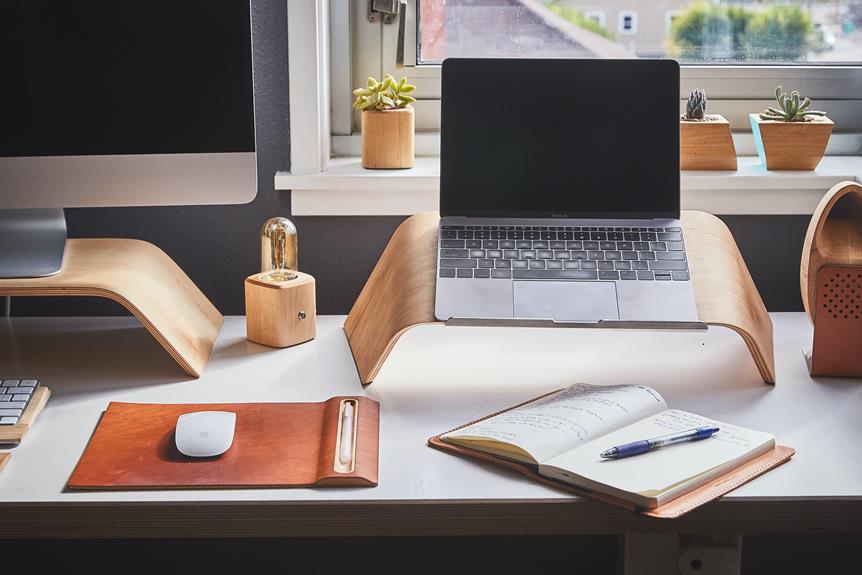If you're considering setting up a home office, you may have wondered if having a desk in front of your bed is a good idea. It's a practical question to ponder.
When it comes to crafting the ideal workspace, the placement of your desk has a significant impact on your productivity and comfort. Let's explore the pros and cons of this setup and delve into the factors you should consider when creating a functional and efficient home office.
Key Takeaways
- Prioritize space efficiency and organization in your home office setup.
- Consider ergonomics and comfort to promote productivity and reduce physical strain.
- Maintain a healthy work-life balance by creating clear boundaries between work and personal space.
- Ensure clear separation between work and relaxation areas to minimize distractions and enhance focus.
Space Considerations
When setting up a home office, you should prioritize space considerations to ensure that your desk in front of your bed doesn't hinder your comfort and productivity. Space efficiency is crucial for a functional home office. Choose furniture that maximizes the use of available space. Opt for a desk that fits well in the designated area without making the room feel cramped.
Consider the layout of your furniture to create an efficient and productive workspace. Placing your desk in front of your bed can work if it's done thoughtfully. However, it's essential to arrange your furniture in a way that separates your work area from your relaxation space. This separation can help you mentally switch between work mode and relaxation mode. Proper furniture arrangement can also lead to better organization and workflow.
Keep in mind that the goal is to create a space that promotes focus and productivity while maintaining a comfortable and visually appealing environment.
Ergonomics and Comfort
When setting up a desk in front of your bed for a home office, consider the ergonomics to ensure that your workspace promotes comfort and productivity.
Proper desk height, chair support, and screen positioning are essential for maintaining good posture and reducing strain on your body.
Prioritizing comfort and ergonomics can contribute to a more efficient and enjoyable work experience in your home office setup.
Bed Desk Ergonomic Setup
Positioning your desk and chair at a comfortable distance from your bed is crucial for a bed desk ergonomic setup in your home office. To ensure an ergonomic workspace and minimize the risk of sleep disruption, consider the following:
- Desk Height: Adjust your desk to elbow height when seated to maintain proper posture and reduce strain on your arms and wrists.
- Chair Support: Choose a chair with adequate lumbar support and adjustable height to promote good posture and minimize back discomfort during extended work sessions.
- Screen Placement: Position your computer screen at eye level to prevent neck strain and minimize eye fatigue.
Comfort and Productivity
To maximize comfort and productivity in your home office, prioritize ergonomic design and comfort. Start by setting up a comfortable workspace.
Choose a supportive chair that allows you to sit with your feet flat on the floor and your knees at a 90-degree angle.
Position your desk at a height where your elbows are also at a 90-degree angle when typing. Consider investing in a standing desk or a desk converter to alternate between sitting and standing, which can help reduce fatigue and improve focus.
Additionally, optimize your environment by ensuring good lighting and proper ventilation.
Take regular breaks and incorporate productivity tips such as the Pomodoro Technique to maintain focus and avoid burnout.
Work-Life Balance
Having a desk in front of your bed can impact your work-life balance. It's crucial to maintain a healthy boundary between work and personal life, especially when your workspace is within arm's reach of your bed. Here's how having a desk in front of your bed can affect your work-life balance:
- Blurred Boundaries: The proximity of your work desk to your bed can make it challenging to mentally disconnect from work, leading to longer work hours and difficulty in switching off from work mode, ultimately affecting your work-life balance.
- Increased Stress: Working in the same space where you rest can lead to increased stress and mental fatigue, impacting your mental health and overall well-being. This can disrupt your work-life balance and make it harder to relax and recharge.
- Disturbed Sleep: Having a work desk in front of your bed may lead to disturbed sleep patterns, as the association of your bed with work can make it harder to unwind and fall asleep, ultimately affecting your work performance and overall quality of life.
Maintaining a clear separation between your workspace and personal space is essential for achieving a healthy work-life balance and preserving your mental health.
Distractions and Focus
Ensuring a clear separation between your work and relaxation space is critical to minimizing distractions and maintaining focus in a home office setup with a desk in front of your bed. Distractions can easily creep in when your work area is so close to your resting place.
To combat this, consider implementing concentration techniques to optimize your focus. One effective method is to establish a designated work zone, separate from your bed, where you can cultivate a mindset geared towards productivity. This separation won't only physically distance you from potential distractions, but it will also help psychologically by creating a boundary between work and leisure.
Additionally, practicing mindfulness and incorporating regular breaks can assist in combating distractions. Mindfulness techniques, such as deep breathing or meditation, can help center your focus and minimize external disruptions. Furthermore, scheduling short breaks throughout your workday can refresh your mind and prevent burnout, allowing you to return to your tasks with renewed concentration.
Psychological Impact
Minimizing distractions and fostering focus in a home office with a desk in front of your bed relies heavily on understanding the psychological impact of this setup. The psychological implications of this arrangement can significantly affect your mental health and sleep quality. Here's what you need to consider:
- Mental Health: Having a workspace so close to your bed can blur the boundaries between work and rest, potentially leading to increased stress and anxiety. It's essential to create a clear separation between your work area and relaxation space to maintain a healthy work-life balance.
- Sleep Quality: The proximity of your work desk to your bed may disrupt your ability to unwind and fall asleep easily. Your brain might associate the bed with work-related stress, impacting your sleep quality. Establishing a designated workspace away from the bed can help preserve the sanctity of your sleep environment.
- Psychological Boundaries: A home office with a desk in front of your bed can challenge the psychological boundaries necessary for productivity and relaxation. It's crucial to establish a mental distinction between your workspace and personal space to maintain a positive psychological state.
Productivity and Efficiency
Having a desk in front of your bed can actually boost your workflow, making it easier to transition from rest to work mode.
Separating your workspace from your relaxation area can enhance your focus and productivity, helping you maintain a clear boundary between work and leisure.
Additionally, the comfort of your home office setup can significantly impact your work ethic and efficiency.
Proximity Boosts Workflow
Having a desk in front of your bed can boost your workflow, increasing productivity and efficiency in your home office. The proximity to your bed offers several workflow benefits and enhances spatial efficiency in the following ways:
- Reduced Distractions: Being in close proximity to your bed allows you to create a focused and distraction-free environment. This can lead to improved concentration and efficiency in completing tasks.
- Convenient Breaks: Having your bed nearby provides a comfortable space for short breaks, allowing you to recharge and return to work with renewed energy and focus.
- Seamless Transition: With your desk positioned in front of your bed, you can seamlessly transition from work to relaxation, optimizing your workflow and overall productivity.
Separate Spaces Enhance Focus
You can maximize productivity and efficiency by creating separate spaces that enhance focus in your home office. Enhanced concentration is crucial for mastering your workflow. Spatial boundaries play a key role in achieving this focus.
When you designate a specific area for work, your brain associates that space with productivity, making it easier to concentrate on tasks at hand. This separation helps you mentally transition into 'work mode' and maintain focus. By physically distinguishing your work area from the rest of your living space, you signal to your brain that it's time to be productive, which can significantly boost your efficiency.
Creating separate spaces within your home office allows you to fully immerse yourself in your work, ultimately leading to heightened productivity and a greater sense of accomplishment.
Comfort Impacts Work Ethic
Positioning your desk in front of your bed can greatly impact your work ethic and overall productivity in your home office. The comfort and ergonomics of your workspace play a crucial role in determining your work efficiency. Here's how it influences your work ethic:
- Workplace Distractions: A comfortable setup can help minimize distractions, allowing you to focus better on your tasks without being constantly disrupted by discomfort or pain.
- Ergonomic Setup: Having a desk in front of your bed allows you to create an ergonomic workstation that promotes good posture and reduces physical strain, ultimately enhancing your work efficiency.
- Productivity Boost: A comfortable and well-organized workspace can contribute to a positive mindset, leading to improved productivity and work ethic.
Organization and Storage
Your home office's organization and storage solutions should complement the layout of your desk and bed.
Effective organization and clutter control are essential for maintaining a productive and efficient workspace.
Consider implementing storage solutions that maximize space saving while keeping essential items easily accessible.
Utilize wall-mounted shelves, under-desk organizers, and multi-functional furniture to optimize storage without sacrificing valuable floor space.
Invest in desk organizers, file cabinets, and storage bins to keep documents, supplies, and equipment neatly arranged and within reach.
Additionally, consider implementing digital organization tools such as cloud storage and digital filing systems to further streamline your workspace.
By incorporating these organization and storage solutions, you can create a harmonious and functional home office that supports your workflow and minimizes distractions.
Remember to regularly declutter and reorganize your space to maintain an efficient and inspiring work environment.
Aesthetic and Design Integration
An essential aspect of achieving a cohesive and visually appealing home office setup is ensuring that the aesthetic and design of your workspace complements the layout of your desk and bed. Achieving design harmony between your desk and bed can significantly enhance the visual appeal of your home office.
Here are three key considerations to integrate the aesthetic and design of your workspace effectively:
- Color Coordination: Select a color scheme that ties the desk and bed area together. Consider using complementary or analogous colors to create a harmonious look. Introducing accent colors through accessories or linens can add visual interest without overwhelming the space.
- Furniture Styles: Choose furniture pieces that share similar design elements. For instance, if your bed features clean lines and a modern aesthetic, consider a desk with similar characteristics to maintain a cohesive look.
- Functional Decor: Incorporate decor items that serve a dual purpose of enhancing the aesthetic appeal while also contributing to the functionality of the space. This could include stylish storage solutions, decorative lighting, or art pieces that tie the room together.
Frequently Asked Questions
How Can I Effectively Separate My Work Space From My Bedroom Space if I Have a Desk in Front of My Bed?
To effectively separate your work space from your bedroom space with a desk in front of your bed, set boundaries by using a room divider or positioning the desk away from the bed. Creating a work routine can also help maintain the separation.
Are There Any Specific Desk Styles or Designs That Work Best for a Home Office Setup in Front of the Bed?
For a home office setup in front of the bed, consider desk ergonomics, space constraints, lighting, and color schemes. Choose a desk style that fits the space and promotes productivity while complementing your bedroom decor.
What Are Some Creative Storage Solutions for Keeping a Desk Area in Front of the Bed Organized and Clutter-Free?
To keep a desk area in front of your bed organized and clutter-free, consider creative storage and space-saving solutions. Embrace minimalist decor and use organization tips to maximize efficiency and productivity in your home office setup.
How Can I Maintain a Professional and Aesthetically Pleasing Look in My Bedroom With a Desk in Front of the Bed?
To maintain organization and an aesthetically pleasing look in your bedroom with a desk in front of the bed, consider using decorative accessories like stylish desk organizers and coordinating storage bins to keep everything tidy and visually appealing.
Are There Any Specific Psychological Impacts or Considerations to Be Aware of When Working in Such Close Proximity to the Bed?
Working in close proximity to your bed can have psychological impacts on productivity, work-life balance, and sleep quality. It may blur the boundaries between work and rest, potentially affecting your ability to unwind and recharge.




